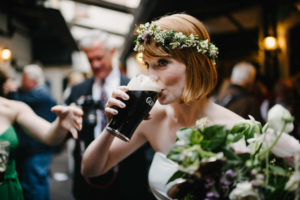
Learning to say no
 You know exactly what they’re going to say even before they open their mouths. As soon as you see them, standing there, a safe distance away, you know their intentions. And you know that you’re exactly the kind of person they’ve been waiting for.
You know exactly what they’re going to say even before they open their mouths. As soon as you see them, standing there, a safe distance away, you know their intentions. And you know that you’re exactly the kind of person they’ve been waiting for.
Because once upon a time, not so long ago, you were standing in the exact same spot, looking for someone just like you; someone of age, but not too old, someone honest, but not too honest, someone who knew the rules, but liked to break them when the mood took.
It’s not something I’m particularly proud of, but whenever I’m approached by youngsters outside an off-license, asking if I’ll take their carefully counted pocket money and purchase them a naggin of vodka, a shoulder of gin, I will, more often than not, oblige.
Obviously, there’s limits; if they look like they’re still in primary school, if they’re already hammered, or if they’re discourteous little scrotes, then I’ll say, “no can do,” and continue on my way. But for the most part I’m happy to be of assistance, happy to break the law and purchase alcohol for these underage teens.
The reason I do this is because I see myself in these kids, I see the hope in their eyes and recall how it felt to be young and bored, how it felt, after hours of trying, to finally get your hands on a few cans, and how delicious those first few illicit sups tasted when you got to drink them. I know that somewhere out there, the parents of these children are sitting at home, oblivious, believing that their kids are at the cinema, at a friend’s house, or wherever, and I also know that if they saw me coming out of the offie with a bag of cans for their sixteen-year-old, the baiting I’d receive would be second only to the one dished out to the child.
But I do it anyway.

That’s no excuse for facilitating underage drinking. But when you grow up in and around pubs, when every shindig, every wedding, christening and communion, is dominated by alcohol, and when little or no attempt is made to shield your young eyes from the excesses of those around you, it at least goes some way towards explaining this mindset.
You may lambast me for buying those kids alcohol, but it’d be more pertinent to ask how they ended up there, outside the off-license, waiting for someone like me? To ask why, at fifteen years of age, they believe that drinking alcohol is something they should do, something which they will enjoy?
I am only the last link in a chain that goes all the way back to their early childhood. This is where the notion of drink being a harmless source of fun and revelry comes into being. We inform and educate our children through our own actions, and, although we might try to tell them different, they can see it for themselves, see that, for some of us, drink is the adult equivalent of sweeties; mammy’s special little treat, daddy’s reward for a hard week at work.
Here’s the good news though: there’s fewer Irish children hanging outside off-licenses and pubs than there was twenty years ago, and fewer gombeens like me willing to help them out. Yes, our teenagers rank near the top in terms of overall consumption, but the number of kids drinking is actually decreasing. Worryingly, this means that those who are drinking are doing so to dangerous levels. However, more and more Irish youngsters are opting out completely, going against centuries of conditioning and having their formative years characterised by something other than vomit-filled shoes and three-day hangovers.
Thanks to the efforts of lobbyists and advocacy groups, and because of extensive advertising and the new Alcohol Bill, an entire generation of Irish people have cottoned on to the fact that going out and drinking fourteen pints – falling flat on your face, having to be carried home – every weekend is not really such a good idea.

Even this, the hottest summer of their lifetimes, couldn’t sway them, with pubs announcing record sales of non-alcoholic beer during the recent heatwave as thirsty pioneers sought alternative ways to cool down.
Let’s not get carried away yet though. Because despite all these changes, despite slipping down the rankings in alcohol per capita consumption, we still have a troubling, often complex, relationship with booze.
After all, how can we espouse the merits of waking up with a clear head, of not seeing a good night wasted, while continuing to portray ourselves as the great, craic-loving Irish? How we can advise against exceeding your recommended weekly intake when the most visited tourist attraction in the land is the place where they make Guinness?
This is what those who are trying to look after us are up against; global industries, money-making commercial brands, and a reputation for inebriety in which we take a perverse pride.
The latest attempt to bite the hands which feed us, has come in the form of a simple yet effective mantra which all of us, myself included, would do well to heed.
The ‘Drink is a Drug’ campaign seeks to challenge our position on underage drinking, in particular the idea of parents allowing their children, their fifteen and sixteen-year-olds, to have a couple of drinks at home, the belief being that it’s safer than having them get it elsewhere. Where this campaign differs is in how it defines alcohol, classing it, correctly, as a drug, and suggesting that it is just as harmful as cannabis, as cocaine or ecstasy.
It asks whether you’d provide your child with a joint, to be smoked under your supervision, a line of coke to be snorted on the kitchen table, or a tablet to be swallowed in the safety of your living-room?
The answer to all of those questions is obviously no. So why then is it okay to give them a couple of cans, to start them on the road to a lifetime of substance abuse? It’s a question worth asking, and one that has made me reconsider my attitudes towards thirsty teenagers stood outside off-licenses.
Where have you been all my life?

Whether it’s down to the thinly-veiled remarks of impatient parents, the slew of invites to the weddings of others, or some strange inner biology, with each passing year our anxiety grows that little bit keener, our fear of dying alone and unloved becomes ever more stark.
And this is just not confined to women either. Us lads feel it too.
However, help may be at hand, for both sexes. Instead of waiting around for the right person, or even the wrong person, why not marry someone who you know will be just right for you: Yourself.
Entitled ‘sologamy’, the act of marrying oneself is becoming increasingly popular, with lonely singletons everywhere saying “I do” to themselves rather than risk further heartbreak and rejection.
The latest person to walk herself down the aisle is 34-year-old Australian woman, Linda Doktar. In a small ceremony conducted at a nearby beach, Ms (or should that be Mrs?) Doktar exchanged vows with her reflection, before, presumably, heading home to consummate the marriage.
Explaining her decision, Linda said, “I thought this was a beautiful concept to symbolise my journey into loving and honouring myself on a deeper level.”
However, the blushing bride then went on to say that although now married, she wasn’t ruling out a relationship with someone else in the future.
Well, I’m sorry Linda, but that’s now how it works. You can’t just marry yourself one day and start cheating on yourself the next. You can’t enter into a loving union, vow to be by your side in sickness and in health, till death does you part, and then go on a date with the first hottie who catches your eye. If you’re going to start that craic, you might as well file for divorce.
I hope, for your sake, you remembered to put in a prenup, because the last thing you want is to have to take yourself to court.










